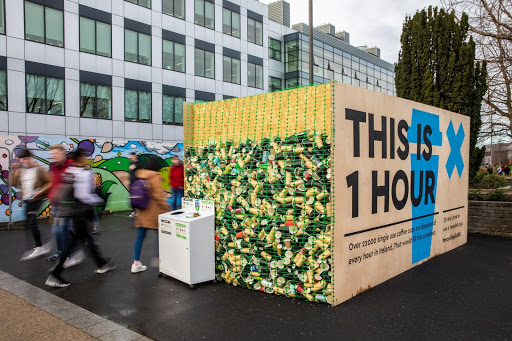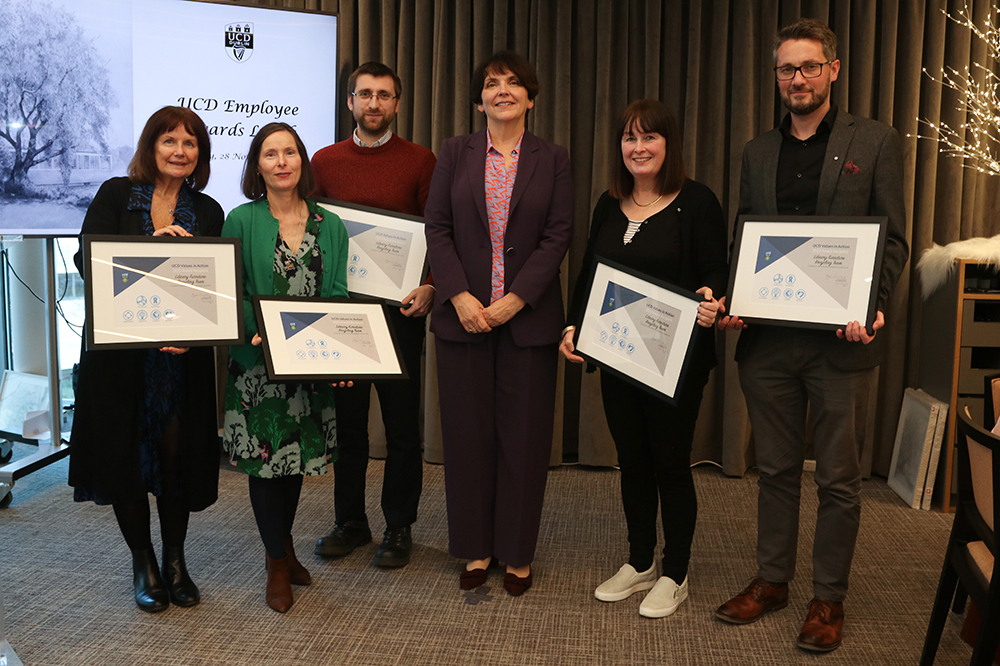
Waste Management
Effective waste management is crucial for reducing environmental impact, promoting sustainability and fostering a culture of responsible resource use.
Overview
Did you know that an estimated 22,000 coffee cups are discarded hourly in Ireland? Little wonder they are consistently in the top five items littered across our beautiful beaches.
When we think of waste reduction, we often imagine cutting down on what we send to landfills or recycling facilities - like the very worthwhile practice of replacing coffee cups with keep cups.
But the story of waste reduction is more complex and extensive. The processes of collecting, transporting and disposing of waste significantly impact our economy and environment. Waste also poses public health and quality-of-life challenges.
UCD recognises the importance of sustainable waste management practices. It recognises that SDG 12 includes targets focused on environmentally sound management of all waste through prevention, reduction, recycling and reuse - and reduction of food waste.
UCD produces approximately 2,000 tonnes of Mixed Municipal Wastes per annum. But through processes used by its waste management service providers, (opens in a new window)less than 10% of this waste ends up in landfill. UCD Estate Services are working to achieve higher direct recycling rates and to continue to identify the most appropriate ways for the university to increase recycling rates.

Campus Initiatives
(opens in a new window)UCD Green Week takes place every March and in previous years has offered tree planting, bike repair workshops, seminars on what happens to UCD’s waste and a ‘dancing for climate action’ event.
Need something for your UCD office, like a printer, desk or chair? UCD (opens in a new window)Warp It, launched in April 2019, is an online furniture reuse platform available to UCD staff and to Irish charity or non-profit organisations. It is part of the Green Campus initiative managed by UCD Estate Service to reduce our carbon footprint by diverting furniture from landfill. It also reduces costs to the University of storage and purchase of new furniture.
930 plates, 190 lunch boxes, hundreds of pots and pans - and one ukulele. This was just one semester’s haul from (opens in a new window)The Great Donate, an opportunity for students moving out of campus accommodation to rehome their unwanted kitchen items.
The UCD (opens in a new window)Green Library Group was set up in 2019 to raise environmental awareness among UCD James Joyce Library staff and to identify opportunities to increase recycling and reduce energy consumption. The UCD library is now an award-winning exemplar of circular economy values in action.
UCD has also carried out workshops on food waste.
Research, Innovation and Impact
Every day, one-third of the world’s food is lost or thrown away - enough to feed the planet’s estimated 690 million undernourished four times over.
At (opens in a new window)BiOrbic Bioeconomy SFI Research Centre, researchers, food producers and industry are working together to create valuable and sustainable bio-based products and services from natural resources.
Research projects at the centre include mining dairy and other agri-food waste for new chemicals, converting CO2 to pharmaceuticals, diversifying grazing crops to improve soil quality and testing biorefineries to generate chemicals, energy and products from crops and agri-food waste.
Other UCD research has looked at (opens in a new window)food and packaging waste in an Irish secondary school.
UCD has many researchers in this area, including:
- Ajay Menon, whose work looks at turning food waste into valuable products, including energy, nutrients and fertiliser. This research provided the springboard for emerging greentech start-up SusBioME, the overall winner of the 2024 UCD VentureLaunch Accelerator Programme at NovaUCD, a hub for new ventures and entrepreneurs at UCD. SusBioME is developing technology for use in the anaerobic digestion process to increase renewable gas yields from biomass.
- (opens in a new window)Tom Curran, whose interests include waste management and air quality. He leads the Horizon Europe project (opens in a new window)BioBeo, on innovative education for the bioeconomy, with 15 partners across 10 European countries.
Education
UCD School of Biosystems and Food Engineering teaches a module in waste management, examining waste generation, waste characterisation and techniques for waste collection, storage, transport, recovery and recycling. The MSc in Environmental Science introduces students to waste treatment processes while the GradCert, GradDip and MSc in Environmental Sustainability explores waste management. UCD also offers an MEngSc in Water, Waste and Environmental Engineering.

Case Study
(opens in a new window)UCD James Joyce Library is an award winning exemplar of circular economy values in action. The UCD Library Furniture Recycling Team was one of only five global green library projects shortlisted for the 2024 IFLA Green Library Award for their project Beyond the Lifecycle: Libraries Supporting the Circular Economy. This project involved the upcycling of used furniture left from the library’s recent Level 3 refurbishment, which already saw the team win the 2023 UCD Values In Action Award. As part of the Capital Development Project
The library team sought to up-cycle as much of the old furniture as possible, offering it to local communities, helping to divert it from landfill, and reducing the overall carbon footprint of the project. This project also helped to build and enhance UCD relationships with community-based organisations. The majority of the upcycled study desks and chairs were original to the Library when it was built in the 1970's.
